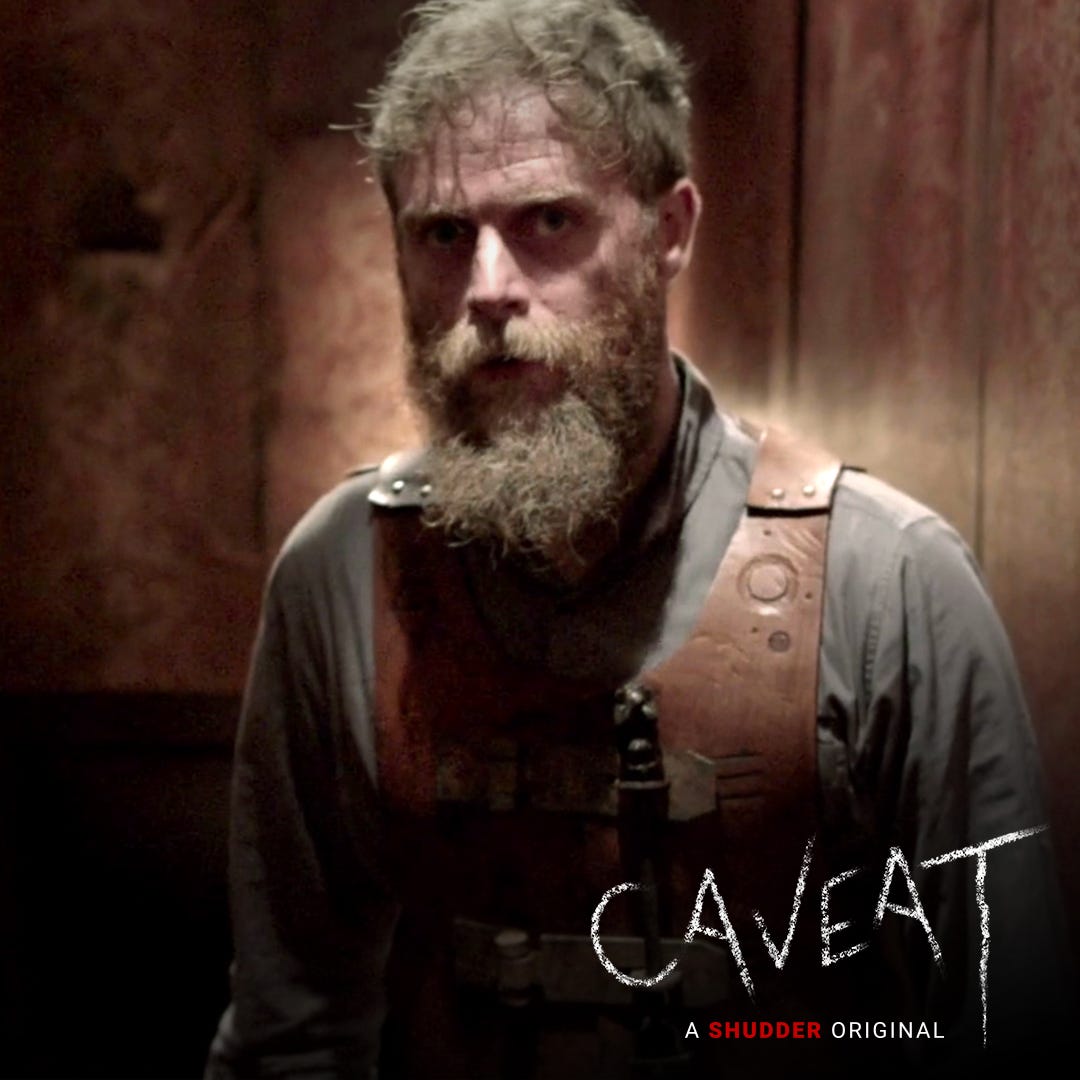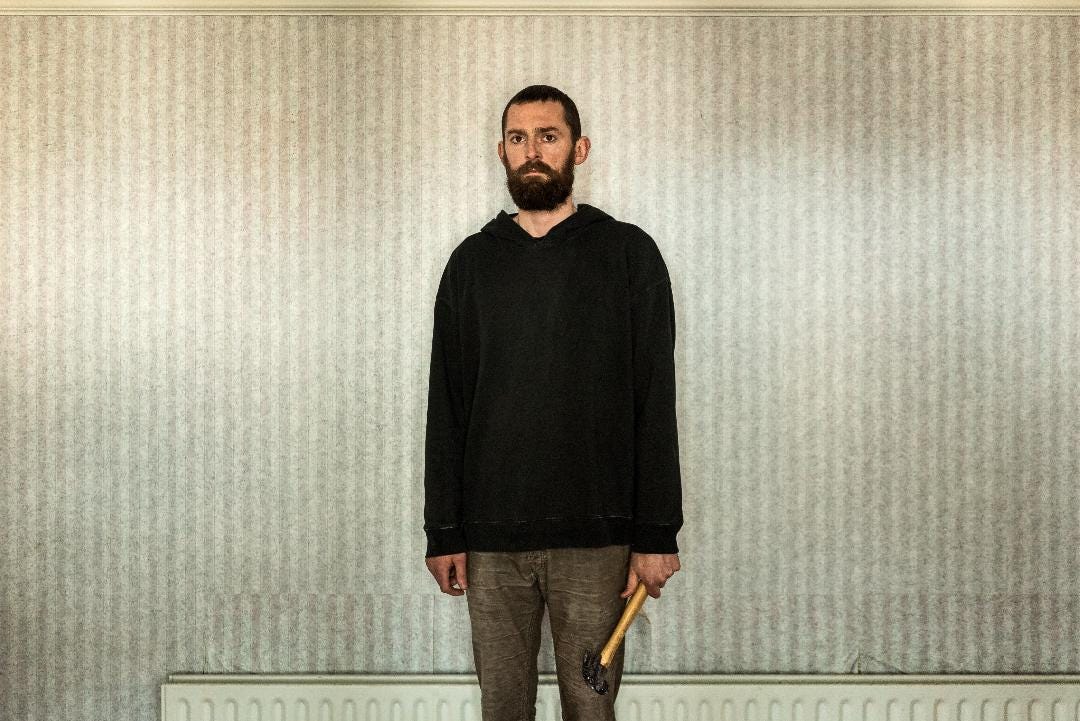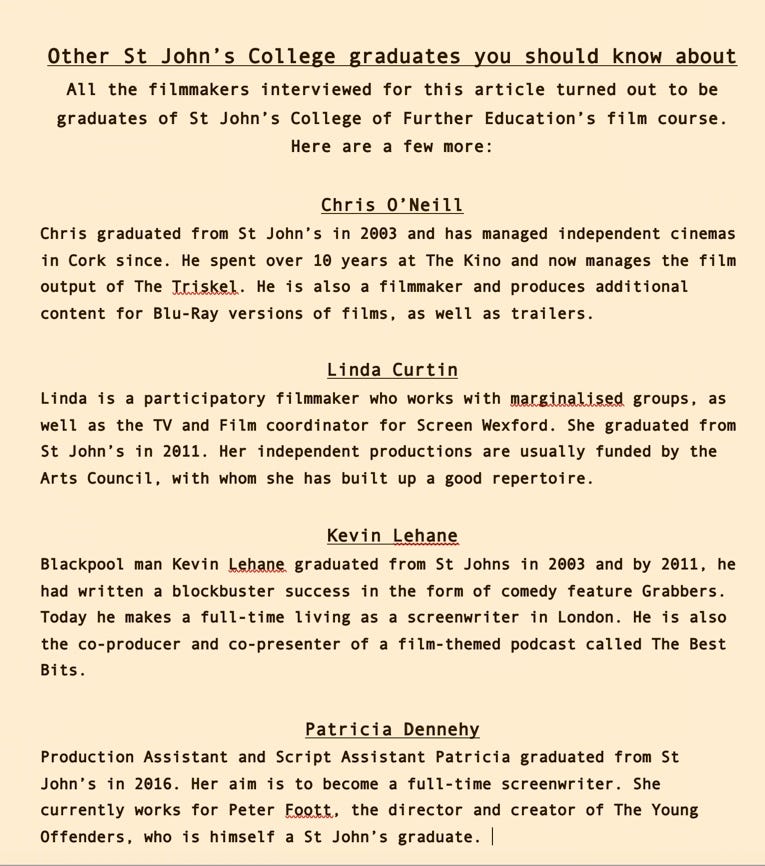Lights, Camera, Action: Behind the scenes with Cork’s filmmakers
Actors, directors and producers steal the limelight in the world of film, but behind the scenes, there are a bunch of talented people in vital roles making that movie magic happen.

When it comes to Cork filmmaking, it’s often big feature films like Michael Collins, Angela's Ashes, The Wind That Shakes the Barley and The Young Offenders that come to mind. But the rebel city is a lot more productive than that, both when it comes to short films and feature length movies.
Cork is home to a wealth of talented film crew, some who work abroad, and more who make their living right here in Cork. This might be news to some, but if you’re familiar with the local filmmaking scene, you’ll know that it's quite vibrant. A lot of the hardest working filmmakers are in roles beyond the actor-director-producer trio that casual moviegoers will be familiar with; many ply their skilled trade behind the scenes in sound, lighting, camera work, make-up, set design and other areas.
The desire to work in Cork’s film industry is probably low down the list for those seeking a secure, pensionable job. Making a living in film usually involves peaks and lulls; being paid lump sums for the big gigs here and there and doing smaller jobs in between. For some, working in a totally unrelated day job is what keeps the wolf from the door.
For the ones who stay local, it’s the valuable time spent working on big productions, making connections, and collaborating with the right people to see their ideas come to life that makes the lull periods worthwhile.
Traditionally, to make a full time living in the film industry, it is cities like London, or at the very least, Dublin, where folks would land regular work. However, with streaming services like Netflix, Hulu and Amazon Prime using Irish studios and locations, the native industry is starting to thrive.
According to data from Screen Ireland's Building for a Creative Future 2024 in 2016, the Irish Film and TV industry supported 11,960 jobs. Irish productions have accrued 31 Oscar nominations since 2010. There are a number of large studios around the country, though there are none in the Cork region at present.
Tripe + Drisheen chat with three Cork-based film industry professionals.
The DOP
Kieran Fitzgerald hails from Glanmire and has worked in Irish film for almost twenty years. In recent years he’s mainly been working as a Director of Photography (DOP) in both drama and factual productions.
Though Kieran is something of a camera nerd, he cut his teeth working as a video editor and colour-grader and shot his own short films, some of which were shot on analogue film cameras.
His main ambition is to remain right here in Cork while being able to make a full time living as a Director of Photography.
So, what got Kieran into film in the first place?
“In my 20s, I read Easy Riders, Raging Bulls, and that really got me interested,” Kieran says. “I started looking around to see if there was anything in the Cork area and I met up with a producer who told me the best thing to do was the St Johns Course.”
St John’s Central College is a hive of activity for media courses and its Film, TV and Video production course is well-regarded. Most Cork based filmy types will have graced its halls at some point or other.
Kieran was DOP on a horror film shot in West Cork in 2017 called Caveat, a feature directed by Bandon native Damian McCarthy. It was well received by the critics and is now streaming on Amazon Prime as well as on horror streaming service Shudder.
Being a Director of Photography is “generally a collaborative thing,” Kieran says. “I’ll talk to the director to see what they would like the film to look like. We’ll go through some still images and try and get a sense of what's required. We’ll also go through the script and try to figure out what way the camera moves are going to be.”
“I’ll also consult with the lighting crew, visit the sets and go through the storyboards with the director. On bigger productions, you could have a camera crew of up to ten people. On the smaller productions you would work with only a camera assistant and a gaffer (lighting rigger). That would be the most common sort of production in the Cork area.”
The importance of the DOP role can’t be overlooked, Kieran says: “How a film looks, and how you get there is totally integral to overall aesthetic of the film.”
What's the best thing about his job?
“When you get to work with a really good director, because you’re able to do some amazing work,” Kieran says. “When they give you freedom and work with you, that’s great. I have to say, working with Damian McCarthy was one of those experiences.”
What was Kieran’s most satisfying job to date?
“I worked as a colour-grader on The Camino Voyage, a documentary by Donal O'Ceilleachair. And being a Director of Photography on Caveat.”
The AD
Niall Owens’ first big job was in 2006 working as a trainee third Assistant Director on a film made in Cork called Strength and Honour.
The film starred Richard Chamberlain and Michael Madsen and was directed by Corkman Mark Mahon. Niall has since earned a living working as an Assistant Director but has recently written, produced and directed his own debut feature film, Gateway, a horror which was screened at IndieCork 2021. He says being based in Cork affords him the opportunities to make his own films.
Niall’s next goal is to secure more screenings of Gateway at film festivals.
Working as an AD involves a high degree of organisational skills, Niall explains. “Someone sends me the script, and I break it down and do a schedule, which is basically the plan for the entire shoot, down to what days we’re going to shoot it, how we’re going to shoot it, what scenes,” he says.
“I schedule all that. Then I communicate with other departments: if there are technically tricky scenes, we communicate with each department to best schedule those scenes. When it comes to the shoot itself, I then run the set. I keep the shoot on schedule. It’s pretty full-on. A lot of people working on set are engaged creatively, so you need to have someone looking at the time and being a counterpoint to that creative aspect, without stifling it.”
Niall’s first foray into AD on Strength and Honour came through St John’s College, when tutor Catherine Murray put him forward for the role. “It was a great first job and I’m still very grateful to Catherine for putting me forward for it,” Niall says.
A lot of his AD work revolves around safety, so it’s a vital role on set. “My job is to make sure everyone is safe and to rely on the experts around me,” he says. “I listen to what they have to say and make sure everything happens in a safe manner. Accidents do happen, but as a first AD, you do everything possible to mitigate. I take pride in being respectful and trying to understand that everyone’s trying to do their job.”
While Niall enjoys his work as an AD, he’s always seen it as a stepping stone towards directing himself, he says.
“Being an AD, you work very closely with directors, and you interact closely with all the departments, so you get to watch and learn how they do things,” he says. “I’ve been very lucky in that I can apply all that I learnt to what I ultimately want to do, which is directing.”
The million-dollar question: can you sustain a living as an Assistant Director in Cork?
“Being based in Cork is perfect because if I was somewhere else, I’d probably only have time to work and pay rent and bills,” he says. “I probably do miss out on work but being at home allows me to turn down certain jobs so I can concentrate on writing scripts and directing.”
Almost more than any other art form, film is about collaborating, being a cog in the giant wheel of the movie production process; knowing your role and how best to work alongside other roles to realise a creative vision is what it’s all about to Niall.
“The job I’m most proud of is a film I worked on a few years ago called Michael Inside,” he says. “It was about a guy going to jail and it was directed by Frank Berry. It’s a lovely movie. A tough movie, but brilliant. The whole experience from start to finish was such an inclusive experience, where you felt you were part of something, not just doing your job. And the finished film was superb. I’m very proud of being part of it. There was a lovely team, all on the same side, pushing to achieve something.”
The screenwriter

Paul Cahill is a screen writer based in Banteer, North Cork. Another former student of St John’s, he decided to focus on writing at the age of 30, and completed an MA in screenwriting in Napier University in Edinburgh in 2014. He has recently won a Wescreenplay international short film scriptwriting award for his war-themed Against My Brothers.
The short film of his script A White Horse, directed by Shaun O’Connor, made it onto the Academy Awards longlist this year when it won the Best Irish Short at Foyle Film Festival 2019.
Following his MA, Paul had a few stops and starts in his scriptwriting career before the recent success of A White Horse, he explains.
“When I moved home from Edinburgh, I worked on developing an Estonian crime drama with an Estonian writer, a Spanish writer and a Scottish story-editor, for a year after graduating. It was a really good experience and it taught me an awful lot, but it never got past the development.”
“I was trying to get into TV then, and I found myself in the Red Rock writer’s room. I was to be a writer on that, but it fell through because they cancelled the show. There were a few things like that, where I almost got in and then for various reasons it didn’t happen.”
Paul has spent the last few years collaborating with directors and has achieved success on the film festival circuit and in script-writing competitions.
“For the last few years, I’ve been concentrating on a lot of short films, collaborating with directors like Jessica Patterson, who directed The Wiremen,” he says. “That was an animated short and it was funded by Screen Ireland in 2018. After that, I worked with Shaun O’Connor on A White Horse.”
What’s the best thing about his job?
“The best thing is having the freedom to tell the stories you want to and seeing them get made, seeing them on the screen,” Paul says.
At present, Paul is putting together a portfolio and he hopes to find an agent to represent him wider afield. To date, A White Horse has been his most satisfying project, but he knows future projects will come with their own creative satisfaction. “They're all really interesting in their own way,” he says.
The 66th Cork International Film Festival runs until the 19th of November in city venues and online. The Pure Cork shorts programme is on in the Everyman on Wednesday, November 10 at 6pm and it’s also available to stream online from November 16 to November 18 here.













Surprised by how vibrant this part of Corks arts world is, I had no idea